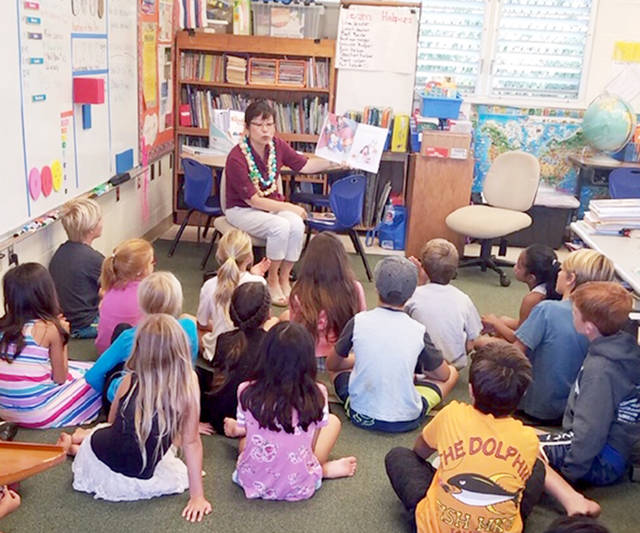KILAUEA — As a woman and a public leader, state Rep. Nadine K. Nakamura last month read two storybooks to Mr. Krovoza and Mrs. Devin’s third-grade class at Kilauea School — and taught them an important life lesson about leadership.
KILAUEA — As a woman and a public leader, state Rep. Nadine K. Nakamura last month read two storybooks to Mr. Krovoza and Mrs. Devin’s third-grade class at Kilauea School — and taught them an important life lesson about leadership.
“If I Were President,” by Catherine Stier, explains the varied duties of the president of the United States. The book provides an easy-to-understand overview of the presidency for elementary-age children. With a diverse cast of girls and boys, the book’s intent is to have children imagine themselves as president.
“Grace for President” tells about a girl who is stunned to discover that all U.S. presidents have been men and decides to kick off her own political career by running for class president. She faces off against a popular boy and wins in a surprising way.
The lesson? That a woman — whether it’s Grace or you — can run for office, win, and lead, said Nakamura, a Democrat who represents Hanalei, Princeville, Kilauea, Anahola, Kapaa and Wailua.
“In Hawaii and across the country, more women are running for office and winning,” Nakamura said. “It’s just a matter or time until we elect a woman president. We need to let our young women know it could be any one of them.”
“Grace for President,” written by Kelly DiPucchio with illustrations by LeUyen Pham, also provides an introduction to the electoral college system, as Grace’s classmates are assigned to represent states with varied numbers of electoral votes.

Subscribe today for unlimited access.
Already a subscriber?
Login
Not ready to subscribe?
Register for limited access.
If you have a print subscription but require digital access,
activate your account.



Note: The National Popular Vote bill is 64% of the way to guaranteeing the majority of Electoral College votes and the presidency to the candidate who receives the most popular votes in the country, by changing state winner-take-all laws (not mentioned in the U.S. Constitution, but later enacted by 48 states), without changing anything in the Constitution, using the built-in method that the Constitution provides for states to make changes.
It simply requires enacting states with 270 electoral votes to award their electoral votes to the winner of the most national popular votes.
All voters would be valued equally in presidential elections, no matter where they live.
Candidates, as in other elections, would allocate their time, money, polling, organizing, and ad buys roughly in proportion to the population
Every vote, everywhere, for every candidate, would be politically relevant and equal in every presidential election.
No more distorting, crude, and divisive and red and blue state maps of predictable outcomes, that don’t represent any minority party voters within each state.
HI has enacted the bill.
Susan Anthony, that’s a bad idea. The reason for having the present system is to prevent high-population urban areas from overpowering smaller-population areas which have different needs than big cities. Your idea would take away Middle America’s voice and give it to the coastal big cities.